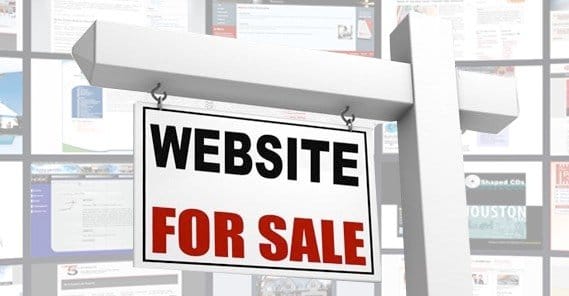7 Signs That It’s Time to Sell Off Your Website

Let’s try a thought experiment. How much money do you make in an average month from your website? I’m talking directly from your website, not from any tertiary or indirect fallout from that site. Take that number and multiply it by 12. Now take it and multiply it again, this time by 2.5.
If I offered to buy that site from you, whole hog, right now, for that number, would you take it?
You could very likely receive such an offer on your site, particularly as your site grows. This is around fair market value, though perhaps on the low end for some sites. Of course, this is only theoretical until you get an offer; your site is only worth what someone is willing to pay.
The opportunity to sell won’t always come and land in your lap while you wait, though. Sometimes, you need to evaluate your position and decide if you want to try to sell your site proactively. Here are some signs or reasons you might want to consider selling.
1. You’ve Found Another Opportunity
What if you want to start a new business? Like, an actual business, not just a blog with a few monetization streams. That kind of endeavor takes a lot of capital, and you can take out a business loan to cover it. Or, you can sell your website.
One plausible reason to sell your site is when you’ve decided you would rather pursue a different opportunity. Selling your site is a good way to get a stack of cash you can then invest in a different idea. Maybe it’s another website, in a different niche. Maybe it’s a more traditional brick and mortar outlet for product sales. Maybe it’s some off-the-wall idea you’d see on Dragon’s Den, making someone some money eventually. In any case, finding another opportunity is a good reason to sell your site.
2. You’re Stable but Aren’t Growing
Some sites hit walls where they just refuse to grow. When you sell a site, you turn over your finances for that site to the prospective buyer. Typically, they’ll look for signs of sudden, rapid growth that is likely going to drop precipitously in the coming months or year. When they don’t see that, they’re more confident in their potential purchase.
You don’t need to tell them that you’ve tapped out the niche or that you’ve tried every method you can think of to grow, with no results. It’s not as though you’re trying to misrepresent your business; you’re just not volunteering information they haven’t asked for.
When you’ve tapped out your niche, it might be time to sell and let someone else have a crack at it. You can use the funds to go on a nice vacation, or to start another site, or to do anything else you see fit.
3. You Have No Choice
Sometimes, life hits you, knocks you down, takes your lunch money and hits you again. Unforeseen medical conditions, a harmful accident, a natural disaster; these can all wreak havoc with your personal finances. Sometimes, after a suitable sufficient disaster, you have nothing left. Your website becomes your primary asset, and you may need to liquidate it in order to pay your bills.
It’s not really something anyone likes to contemplate, but it’s a perfectly valid reason to try to sell your site. Just be aware that most buyers won’t be particularly sympathetic; they’ll still want to get the best deal they can, in the face of your pain. Honestly, it’s probably a better idea to look into other solutions and keep your steady income stream as intact as possible.
4. You’ve Reached a Payment Threshold
Some people build websites specifically to sell. In these cases, you likely have a specific goal in mind. For example, if you take the annual income times 2.5 valuation, you can calculate exactly how much you need to be making per month in order to sell your website for $100,000. For the record, that figure is about $3,300 per month.
If you go into online moneymaking with the idea of selling websites, you need to set aside monetary goals and determine when you want to sell your site. Work to bring your site up to the level where it can get that much, but don’t try to push beyond it. At a certain point, you encounter diminishing returns, until you’re spending more trying to boost your revenue than you’d get in return for selling at the higher price.
5. You’ve Received a Great Offer
Remember that first paragraph, where I hypothetically gave you an offer? Would you sell the site?
That’s the exact question you’ll have to ask yourself if and when such an offer rolls around. Before you decide, though, you need to consider. Is the offer fair? Is it significantly more than you think the site is worth? Be wary of extreme offers, particularly when they aren’t solicited. It could be a scam.
Conversely, the offer might be far below what you would expect. Don’t sell the site to such a lowball offer, no matter how much they try to convince you that their price is realistic. They just want a good deal they can flip for the real value of your site.
6. You’ve Noticed a Rising Competitor
Sometimes, all it takes to trigger an exodus is the appearance of an up and coming competitor. If you’re sufficiently forward-thinking, you might notice their rise and determine that within a year or two, they’ll have taken over your niche. This would obviously hurt your bottom line.
In these cases, it might be a good idea to sell the site and get out before it collapses. You make two years or so in instant income, and have plenty of leeway to do better things with your cash. Meanwhile, the rising competitor becomes the challenge for the buyer to overcome.
7. You Just Don’t Care
Perhaps the number one reason to sell your site is apathy. Running a successful site requires, in large part, at least some passion for what you’re doing. If you find yourself losing that passion, it might be time to get rid of the site before it becomes more of a burden than a joy. When updating your site is a chore, it shows, and your site will slowly wither and die.

 ContentPowered.com
ContentPowered.com





